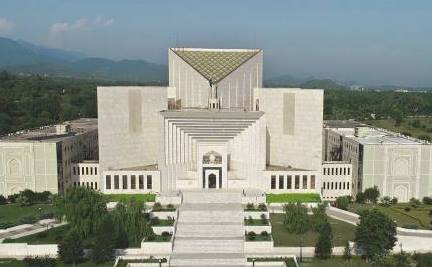ISLAMABAD – Justice Jamal Mandokhel raised the question of whether the armed forces, under the executive, can exercise judicial authority as per the constitution during hearing of the intra-court appeal against civilian trials in military courts at the Supreme Court on Thursday.
A SC seven-member constitutional bench, headed by Justice Ameenuddin Khan, is conducting the hearing, which included Justice Muhammad Ali Mazhar, Justice Hassan Azhar Rizvi, Justice Musarrat Hilali, Justice Naeem Akhtar Afghan and Justice Shahid Bilal Hassan.
PTI founder Imran Khan’s lawyer Uzair Bhandari is presenting his arguments, stating that the issue is to determine what the constitution permits. He argued that ordinary amendments cannot affect fundamental rights. He also pointed out that Salman Akram Raja’s example would apply only to civilians. Justice Jamal Khan Mandokhel had mentioned that under Article 83-A, the status of armed forces needs to be considered, and there is nothing in the Army Act except for the provision of 2-1-D.
Justice Jamal Khan Mandokhel remarked that according to Article 243, its application already exists. Lawyer Azir Bhandari responded that judgments on this matter exist, and it is necessary for the subject to confess in order to proceed. He added that except for court-martial, there are no provisions for such trials.
Justice Ameenuddin Khan remarked that it is not necessary for it to apply.
Uzair Bhandari countered that this is not so simple and that F.B. Ali had clarified the status. He added that any member, regardless of affiliation, must follow the law, and 2-1-D does not fall under Article 83-A, as clarified by F.B. Ali. If it were to fall under it, there would be no need to consider fundamental rights. He emphasized that the Army Act only pertains to discipline.
Justice Ameenuddin Khan remarked that employees covered under Clause C would not take an oath. Uzair Bhandari replied that those under Clause C can never be court-martialed, as court-martials are always conducted by officers. Justice Ameenuddin Khan observed that the armed forces members would determine the nature of the crime. Uzair Bhandari argued that the nature of the crime does not negate fundamental rights.
Uzair Bhandari also pointed out that India’s constitution has a provision similar to Article 175(3) of Pakistan’s constitution. He explained that while parliament does many things independently, there are matters it does not address, and in such cases, the judiciary steps in, just as in the UK. He mentioned that the British Parliament was urged by the judiciary to address a matter for ten years, but when parliament did not act, the judiciary took it up itself.
Uzair Bhandari stated that he does not believe in the lack of judicial jurisdiction and that he desires an expansion of judicial authority, despite the limitations imposed by judicial precedents.
Justice Muhammad Mazhar remarked that Uzair Bhandari is suggesting that declarations are made by courts. Uzair Bhandari responded by referring to the judicial annulment of Zia-era amendments in the Benazir Bhutto case. He mentioned that parliament has the power to make, amend, or withdraw constitutional laws. If a law is incorrect, people challenge it in courts. He also cited the Iqbal Zafar Jhagra case, where the court annulled the 1937 tax collection law, and emphasized that the court-martial system does not fall under Article 175-A.
Justice Ameenuddin Khan asked what would happen if a person falls under 2-1-D.
Uzair Bhandari argued that on this basis, the court cannot strike down the court-martial system. He stated that the main point is that civilians cannot be included in the court-martial system, and those already under it cannot be included.
Justice Jamal Khan Mandokhel inquired what would happen if 2-1-D were removed. Uzair Bhandari replied that the court-martial system would still continue; the train is running, and it cannot be stopped.
Justice Jamal Khan Mandokhel remarked that this means the train should continue, and one bogie should be removed. Uzair Bhandari responded that Justice Muneeb Akhtar had provided the historical context of the court-martial system in his decision, stating that the system could not be abolished. However, he ruled that the civilians could not be court-martialed.
Justice Ameenuddin Khan pointed out that Salman Akram Raja had disagreed with Justice Muneeb Akhtar’s decision. Salman Akram Raja confirmed that he and his client completely disagreed with Justice Muneeb’s decision, and questioned whether a trial under the Army Act would be applicable if there was a civilian conspiracy.
Uzair Bhandari argued that the court could also review laws enacted before the constitution came into effect. Justice Jamal Mandokhel asked whether the military justice system would continue even if 2-1-D were removed.
Uzair Bhandari argued that the train would continue, and the question is who can be placed on board and who cannot. He emphasized that the decision by Justice Muneeb suggests that the court-martial system would continue, although there are options for improvements through parliament even under martial law. He added that military courts are outside the scope of Article 175, and civilian trials can only take place under 175. The military cannot go beyond the scope of Article 245.
Justice Jamal Mandokhel raised the question of whether courts created for the purpose of (3)8 can try others. He questioned if the armed forces, under the executive, could use judicial powers, and whether courts should be independent or not.
Uzair Bhandari said that he would respond to the judicial questions after the break, and the hearing was adjourned for a break.










